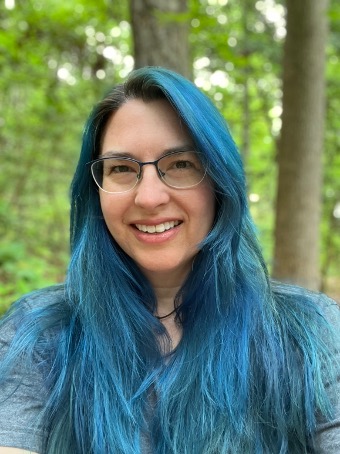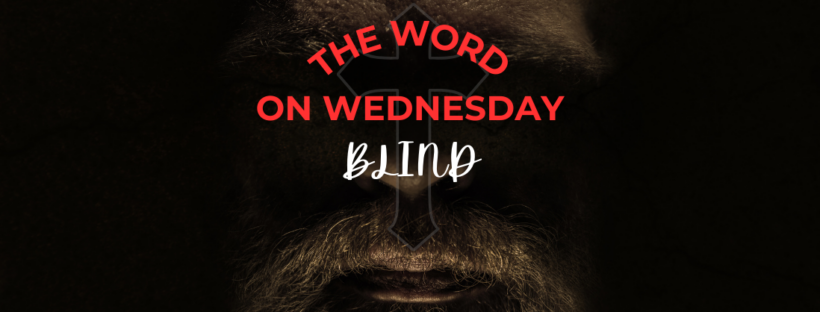Then the LORD said to him, “Who has made man’s mouth? Who makes him mute, or deaf, or seeing, or blind? Is it not I, the LORD?” Exodus 4:11 (ESV)
Blind to the Problem
I spent several college summers as a camp counselor. A girl returned for an additional session. I recognized her red hair and the sound of her voice. She’d been in my tent a few weeks prior. We chatted for several minutes before she said, “You don’t remember me. What’s my name?” I couldn’t answer.
For years, I thought I had trouble with names. Then, my husband and I saw a woman at the store. I knew I should be glad to see her and had a strong urge to hug her, though I wasn’t sure why.
As she walked away, Patrick leaned toward me. “You don’t have any idea who she is, do you?” He gave me various hints, then finally gave up. “We stayed at her house a few months ago. You spent the entire weekend in the kitchen with her, baking pies and biscuits.”
I remembered the weekend clearly, but her face rang no proverbial bells.
Coping With Face Blindness
Concerned I might be losing my mind, I started paying attention and realized my issue wasn’t with names, but with faces. I often relied on specific traits to help cue my memory—like cool hair, a signature smile, or particular ears.
Patrick, ever supportive, prompted me when we encountered acquaintances in the wild by whispering a name or calling, “Hey, Jan!” as they approached. Knowing the name didn’t bring visual recognition, but I generally had enough clues to understand who they were and have a coherent conversation. Often, I recognized a voice before a person’s face snapped into focus, if it ever did.
Before attending conferences, I spent hours scrolling through event-specific online groups to find markers to prompt my memory. (For the love of Pete, please stop with the filters.)
Understanding Face Blindness
Still, I didn’t truly understand the problem until a friend mentioned his son’s face blindness, or prosopagnosia. After a bit of research, I no longer felt alone. My brain was not broken, it just processed faces in a different way. In a sense, my facial-recognition software had a glitch.
It’s easy to wonder why God allows certain differing abilities to flavor our lives. Wouldn’t it just be easier if everyone had full use of all faculties?
Blind to Possibilities
When God spoke from the flaming bush that did not burn up, Moses tried to weasel his way out of service. He highlighted his inability to speak effectively as proof God couldn’t use him. God reminded Moses that differing abilities are designated by God himself.
Like Moses, when we feel less able in some way, we may try to get out of our calling or ask God for healing. It’s easy to be frustrated. “Why can’t you make me like everybody else?”
But we forget: even if their disability or difficulty isn’t easily visible, everyone has something. No one is perfect. And God knows what we need to make us rely on him.
Blindness (or Other Difficulties) Can Change Our Perspective
Sometimes, mindset matters. The blessing of difficulty is perspective. Differences can serve a divine purpose, bringing
- deeper empathy for those with similar challenges,
- appreciation for support systems, and
- courage to be honest about limitations.
Often, when I explain my situation, others feel free to share their own difficulty, which creates meaningful connection.
See the Positives
Our challenges, whether visible or not, can build bridges with others. Nothing is inherently good about Lupus, or arthritis, or MS, or cancer, or any number of difficulties—but having experienced it, maybe you can encourage someone else. This week, let’s allow God to use our ineffective abilities to strengthen our connection with and compassion for others.
Need encouragement to face a challenge and find the good in it? Look no further than BLIND, by Becky Antkowiak Share on X
Becky Blue Antkowiak’s greatest joy is helping writers access education and find connection so they can effectively communicate God’s love to readers. Chief Encouragement Officer of both Christian Writers Institute and the 540 Writers Community, she’s also a writer, speaker, editor, Compassion International advocate, and enthusiastic Grammar Floozy. A lifelong serial extrovert, Becky believes strangers are friends she hasn’t met, and she can’t wait to hear your story. Fair warning: make eye contact only if you want a friend for life.
Visit Becky’s website…
Find more Word on Wednesdays here…

Becky, what a good message. I had never heard of this so I am immensely thankful t you for bringing it to light.
This is good, Becky. SO much to think about…We need to accept ourselves as God made us, because there’s someone out there who needs what we have to give.
KB